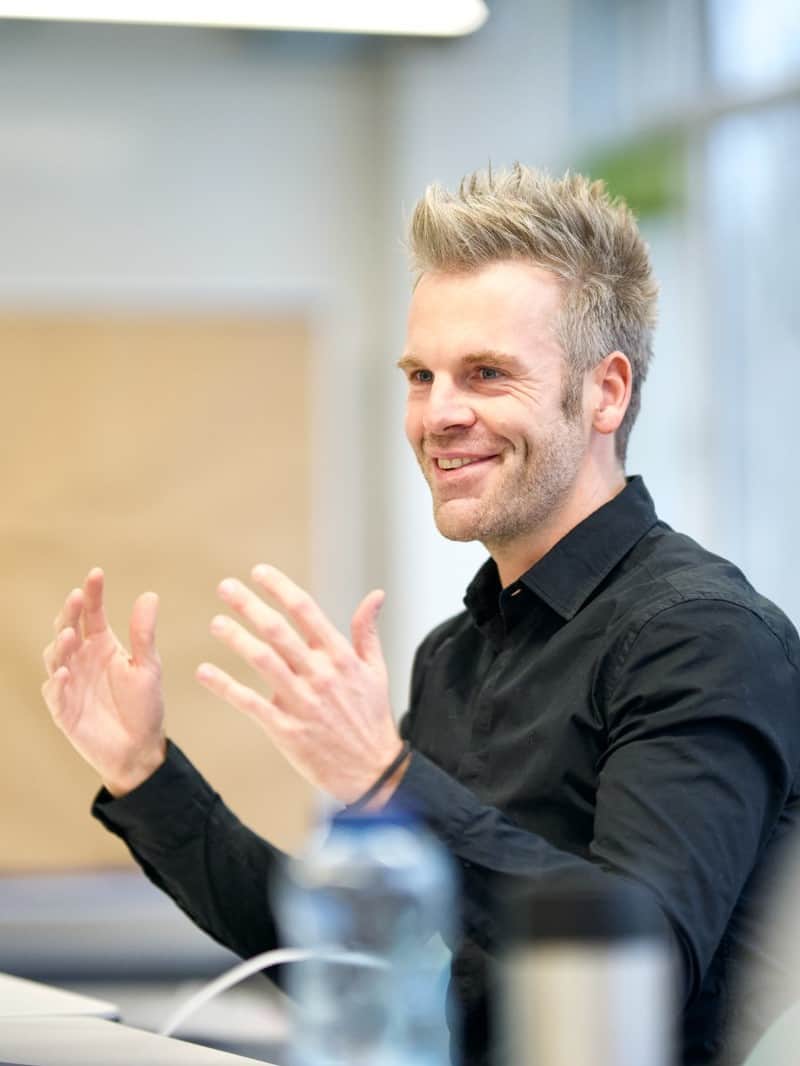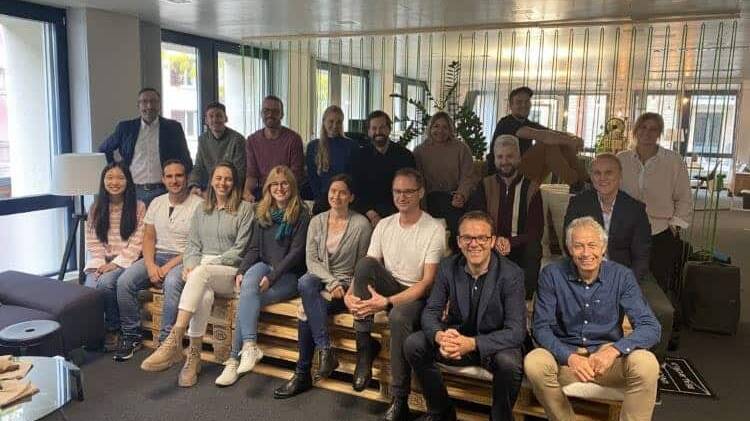E-commerce pioneer Thomas Gottheil recently sold his startup Frontastic to the unicorn commercetools. Such an exit is a big event for every entrepreneur, a crowning achievement of a career, but not completely life-changing.

Co-founder, Frontastic
Thomas Gottheil co-founded the software startup Frontastic in 2017 together with Henning Emmrich, Kore Nordmann, and Tobias Schlitt. Frontastic was sold to commercetools (a headless commerce platform that raised just before raised a USD 140m Series C at a USD 1.9B valuation) in November 2021. Frontastic enables fast-growing brands to build websites easily using a so-called headless software architecture. Verve Ventures invested in Frontastic early in 2021. Before founding Frontastic, Thomas led a company that developed e-commerce platforms.
How do you feel, having sold your startup Frontastic half a year ago?
An exit is certainly not an everyday event, it does feel good (laughs). It wasn’t a big break, however, since I continue working for commercetools. My task now is to integrate Frontastic and scale it up. The difference is that as a founder, you are independent in your decision-making, guided by the board and investors. As part of a larger organization, this changes. Then there is the question of how life changes when the money from the exit hits your account, and if you’re able to handle this change in a meaningful way.
Are you?
I think it helps that I’m already 42 (laughs). I don’t feel an urge to change my life completely. It has also proven to be helpful that I invested in Frontastic via a holding company, not directly. This means that the money went into my piggy bank, so to say. This separation from the private account I use to pay bills is a good thing.
That’s an interesting point. Different accounts help us see the different purposes of money.
For me, as an entrepreneur, it’s clear that I want to move things. I have decided, however, that for the time being I won’t do direct angel investments. I’ve worked full steam for 20 years, I want to concentrate on the integration right now, and before I put energy in new projects I want to get a clearer picture of what these should be. This is why I find Verve Ventures’ model interesting. It is a very good learning platform. You do professional due diligence, which reduces some risks, and you prepare and present the material in a very nice way, which reduces the amount of work for investors. I enjoy joining the video calls with founders and learn a lot even in those cases where I don’t invest.
“Startups solve problems. As an investor, I get to vote on what kind of problems I think need to be solved.”
Why invest in startups?
I’m convinced that entrepreneurship is important. And I’m curious. Startups solve problems. As an investor, I get to vote on what kind of problems I think need to be solved.
You have more than two decades of experience in e-commerce. What were the most important drivers for change during this time?
One of the most important technical changes was Apple’s introduction of the iPhone in 2007 which heralded the shift in commerce from desktop to mobile. This posed a major challenge for commerce system providers to address this new channel. At the same time, Amazon with its massive financial resources raised the bar of what customers could expect from their online shopping experience. Smaller players lacked the power to develop similar all-encompassing commerce solutions. This led to a great unbundling, to greater choice and to a world where retailers would assemble their e-commerce solutions from different components. Software design had to make sure that applications work well together with others, what is called “API first”, and in e-commerce architecture, the frontend or “head” became decoupled from the “headless” content management systems. The timing to launch Frontastic, a front-end platform, wasn’t a lucky coincidence; it was based on our experience in e-commerce.

Invest in Startups
As one of Europe’s most active venture capital investors, we grant qualified private investors access to top-tier European startups. With investments starting at EUR/CHF 10’000, you can build your own tailored portfolio over time and diversify across stages and sectors.
And what made 2021, just 4.5 years later, the right time to sell the company?
An exit window opened up, and we basically had two options: The first was to ignore it and continue growing the company with the vision to establish a completely new software category in the market, Frontend-as-a-Service. That would have been a long journey and we would have needed to raise a lot of money. The second option was a concrete offer from commercetools. The company was one of our first partners, and the partnership became more and more relevant for them over time. commercetools has grown incredibly fast. Last year, CEO and Co-Founder Dirk Hoerig was quoted as saying that the company plans to surpass USD 100 million in annual recurring revenues in 2022. Their motivation to buy Frontastic was that they needed us to win small and medium-sized companies as clients to keep up the rapid growth. In an exit scenario, the decisive question is if the buyer needs you or just wants you. And they needed us. In the end, when we discussed these two options among the founders, it was clear that this exit window would be shut forever if we didn’t act upon it – commercetools would have bought another company.
What are your learnings from the exit process?
I have known Dirk for many years and our relationship of mutual trust was very helpful during the process. You know you can expect honest answers when you ask “Where do we stand?” during tough negotiations. We had an offer from them on the table, and we decided not to enter a formal bidding process with other parties, but rather to concentrate on a good outcome among our two parties. Selling a business is complex. The contract is 160 pages, the appendix to it 684 pages. Knowing that you can rely on a lawyer that you trust is essential. At the same time, you can count yourself lucky if the counterparty has a pragmatic and entrepreneurial lawyer as well. One thing that served me well is that I had defined clear showstoppers for the founder-team before entering the negotiations. This allowed me to give the counterparty a clear signal, “this we won’t do”. It shows you’re serious. You need to be assertive, but not arrogant.
Let’s finish by discussing a topic that has gained relevance during the pandemic, namely, how to organize work. Frontastic was a fully remote company before it was cool. Why did you decide, in 2017, that Frontastic will be a company without an office?
It is true that at that time, there weren’t many examples of fully remote companies. It was also a radical decision that rather old-school investors didn’t understand at all. They laughed and said: “Ah so you’ll be sitting in the Bahamas and will be doing a little bit of coding, that’s your plan?” Fortunately, other investors, including Verve Ventures, understood that being fully remote is not a constraint, it opens up more possibilities, including more freedom when it comes to hiring. The initial motivation came from the fact that the founders were dispersed regionally. And we decided to build the company culture based on this concept.
Skeptics would say that company culture is essential for success, and that without direct human interaction in a physical place, there cannot be a common denominator.
Company culture is important, but it is the result of how you live your values in everyday work. As a remote company, our mode of communication is much more asynchronous than that of a traditional company. This means you need people that can communicate clearly by writing and like to do so. When we started, long before Covid, we were very explicit about our model. So we attracted people who think differently, who don’t want to lose time commuting and own their work. We have a non-parental culture. You don’t need to ask permission if you go to the gym in the middle of the day – you need to make sure your team knows when you’re away. It is a model that is based on the autonomy of the individual, not on control. And we refined it over time. Today, we don’t send new joiners a company laptop. We send them a debit card and they buy it.
If that model doesn’t end in chaos, then maybe in solitude?
Remote doesn’t mean that we don’t talk to each other or that there is no space for social bonding. We do organize retreats and come together, but we don’t need an office for that. We came up with a nice system that allows for independent work and coordination at the same time. There are two daily Remeet time slots for meetings, at 11am and 3 pm, and you input who you need to talk to and how urgent it is and the tool assigns the meeting slots. And the remaining hours are meeting free for most people and dedicated to asynchronous work. Frontastic has 60 employees in 20 different countries. I would argue that being fully remote is much less of a headache than hybrid work models. Trying to accommodate remote and office work at the same time, with all the implications for office space, doesn’t seem to have a simple solution.
Written by
WITH US, YOU CANCO-INVEST IN DEEP TECH STARTUPS

Verve's investor network
With annual investments of EUR 60-70 mio, we belong to the top 10% most active startup investors in Europe. We therefore get you into competitive financing rounds alongside other world-class venture capital funds.
We empower you to build your individual portfolio.
More News
27.10.2021
How TestingTime was built and sold
After two startup failures, Reto Lämmler gave himself one final chance. This time, it was a success. In this interview, Reto recounts how he built TestingTime into the European market leader using lean startup principles and sold it to the Norwegian market research company Norstat.
23.09.2021
“When the stars align, you can’t wait”
In this interview, entrepreneur and investor Gaëtan Marti recounts how difficult it can be to find financing for a startup, how he bootstrapped Atracsys and eventually, despite different plans, sold it to a big MedTech company.
25.01.2021
“Headless software architecture can lead to headaches”
E-commerce is booming, but many companies still struggle to differentiate themselves with their digital storefronts. In this interview, e-commerce software expert Ulrike Mueller explains what headless commerce means, why this is the way the industry is heading, and why she joined the startup Frontastic as a board member.
Startups,Innovation andVenture Capital
Sign up to receive our weekly newsletter and learn about investing in technologies that are changing the world.




